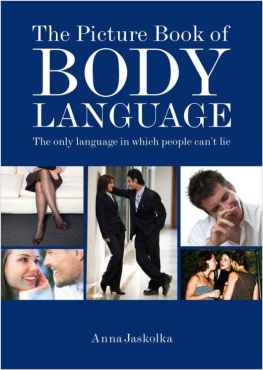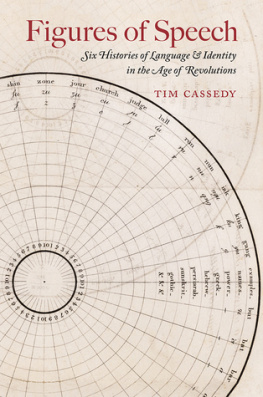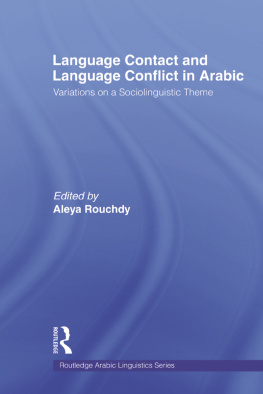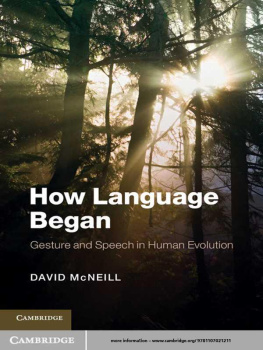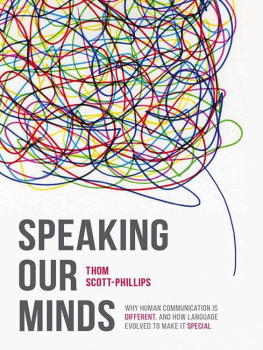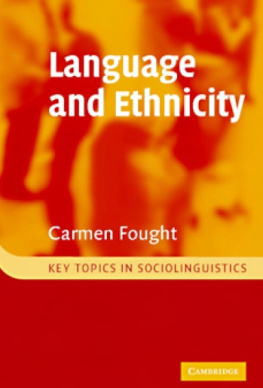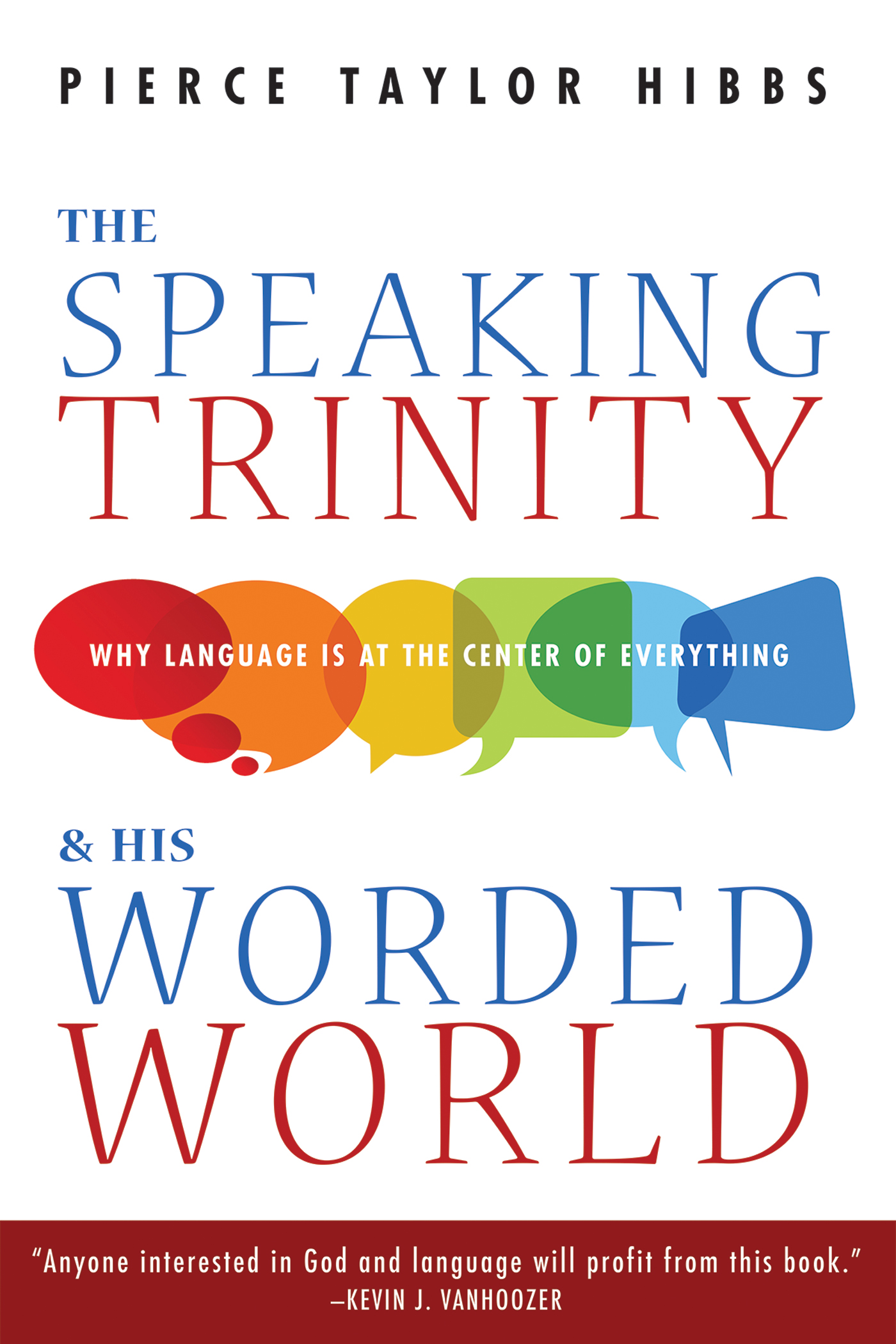Hibbs has given us an excellent book to present in accessible form the biblical basis for the centrality of language in Gods communion with us, in Gods creation and providence, and in human living. The book combines biblical exposition, practical examples, and clear, winsome writing. There is nothing like it on the subject of language!
Vern S. Poythress Author, In the Beginning Was the Word: LanguageA God-Centered Approach
The last century has witnessed a major preoccupation with language among philosophers. Theologians, too, have tried often to understand the language of Godhis word Hibbs stresses the centrality of language to reality and to human life, and he persuasively expounds his view that language is communion behavior . This thesis has huge importance, and therefore I hope that the book finds many readers.
John M. Frame Author, Systematic Theology: An Introduction to Christian Belief
What a bracing theology Pierce Taylor Hibbs has given those of us who have been called to preach the word! Those who read and meditate on The Speaking Trinity and His Worded World will find their knowledge of God and his word expanded and elevated. Preachers will find their hearts on fire to preach Gods holy word.
R. Kent Hughes Author, Disciplines of a Godly Man
This extraordinary book brings together themes from linguistics, biblical theology, and apologetics, arguing that human language derives from the communion behavior of the divine Trinity No one is more qualified to accomplish this task than Pierce Hibbs. His years of experience both as a theologian and a language instructor bear fruit in this profoundly edifying study. Accessible to the specialist and the non-specialist alike, the book bristles with insights. It has the makings of a classic.
William Edgar Author, Created and Creating
In a post-post-modern age that despairs of language, meaning, and truth, Pierce Hibbss reminder that languagecommunicative and expressive behavioris ultimately rooted in the triune God comes as a welcome Christian relief. Of particular importance is the claim that language is always personal and covenantal, oriented to communion, and that God is a speaking, communicative being. Anyone interested in God and language will profit from this book.
Kevin J. Vanhoozer Author, Is There a Meaning in This Text?
Building on the work of Van Til, Frame, and Poythress, Hibbs has written a fascinating account of the Trinity as communicative, with language integral to creation and the nature of humanity in communion with God. Superbly written, his highly accessible discussion should do much to stimulate thought about God as Trinity he mounts a credible case that the Trinity is discernible all around us.
Robert Letham Author , The Holy Trinity
God created the world by speaking and his own Son is identified as the eternal Word. Gods works of creation, providence, redemption, and consummation are all attributed to his powerful speech. So biblical faith is bound up with wordswith languagein a unique way. Thats why this is such an important book. Regardless of whether one agrees with all of the arguments, I expect it to strike up a fresh and crucial conversation about God and language.
Michael Horton Author, The Christian Faith
This is a well-written book with a provocative thesis. Whether one ultimately agrees with all of Hibbs contentions, his is a voice worth taking seriously.
Jonathan Master Editor, Place for Truth
The Speaking Trinity & His Worded World
Why Language Is at the Center of Everything
Pierce Taylor Hibbs
Why Language Is at the Center of Everything
Defining Language
L et me begin by defining language.
Language is difficult to define because our entire lives are immersed in it. We have to use language to define language, which is a strange thing when you think about it. We do not use paint to define paint or gravel to define a roadwe use language to define these things. But when we are dealing with language itself, we are dealing with something so basic to our existence that it must be used as it is being understood. When we begin discussing language, we are already caught up in its current. In later chapters, I will suggest why this is the case theologically.
Language is also inherently difficult to define because of the array of purposes it serves. At a local business, language might be commonly perceived as a means of information transfer. In an undergraduate course on Romantic literature, language might be praised as a poetic medium. For parents trying to shepherd a toddler through a season of temper tantrums, language often serves an instructional purpose, expressing boundaries for acceptable behavior and solutions for frustration or emotional overload. Considering its sundry purposes, when we define language, we run the risk of either being too narrow or too broad. On the one side, too narrow a definition would not account for the range of purposes that language serves, and it might also segregate language from other parts of life in an unnatural way. For instance, the greeting hello is virtually unintelligible if we do not account for the contextually appropriate actions and environments in which it is embedded. Hello could be a casual greeting, if two strangers are passing on a street. Or it could signal the beginning of a conversation if the two persons are friends. It would not, however, be spoken by a man to his family as he was getting into a taxi and leaving them behind. In this last example, goodbye (or some similar expression) would suite that social and physical environment. Thus, we cannot ignore other parts of lifeeven physical environmentswhen we define language. A narrow definition would run the risk of just that. On the other side, too broad a definition would end up being useless, since language would then not be distinguishable from everything else that we do. If we define language as an action performed by humans and directed towards other humans, then language would be no different from throwing a football. How do we settle this? How do we define language neither too narrowly nor too broadly?
We should stop here before going any further, since we are getting ahead of ourselves in trying to address such questions before opening the good book. What does Scripture reveal about how we might define language? The very word of God should be our starting place for every definition. Of course, Scripture is not a dictionary, but it does have much to say about human communicationin fact, an overwhelming amount! Let us start with just one passage.
One passage that has been historically referenced by theologians as having unique significance for our understanding of language is Johns Prologue, especially John : and :.
In the beginning was the Word, and the Word was with God, and the Word was God. He was in the beginning with God. All things were made through him, and without him was not any thing made that was made.
And the Word became flesh and dwelt among us, and we have seen his glory, glory as of the only Son from the Father, full of grace and truth.
As I will explain more fully in the following chapter, in calling the second person of the Trinity the Word, John is showing us that language has divine origins. In the beginning was not just God but the Word , and this Word was toward God or facing God. The Wordboth as a divine person and as some high form of divine interpersonal discoursewas in the beginning. As one theologian remarked, we might translate Johns verses more poetically: In the beginning was Discourse, and Discourse was with God, and Discourse was divine. The Word as eternal Son and as divine discourse, eternally communicated by the Father in the hearing and power of the Spirit, indicates that language is not a human invention; it is a divine disposition, a disposition to express, in the highest sense, mutual love and glory among the persons of the Godhead.


